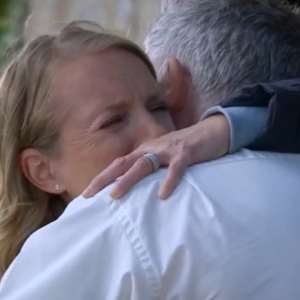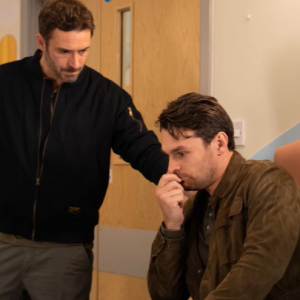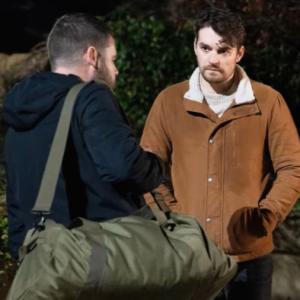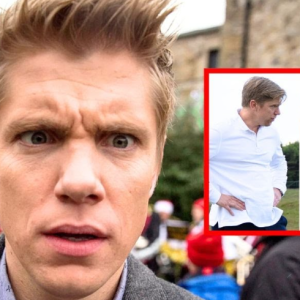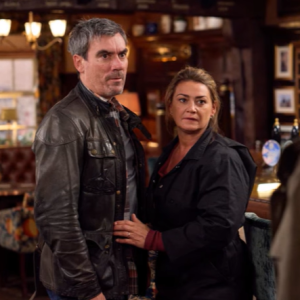The Dales are no stranger to peril, but rarely has a character’s fate hung by such a slender, treacherous thread as Mackenzie Boyd’s this week. In a heart-stopping, claustrophobic episode of Emmerdale, viewers were dragged into a chilling psychological battle for survival, culminating in a death threat that leaves Mackenzie’s future – and possibly his life – in the merciless hands of a deranged killer. As the village grapples with Jon Sugden’s reign of terror, the question isn’t if Mackenzie will face death, but when, after one desperate, ill-fated mistake sealed his horrific destiny.
Just when the residents of Emmerdale, and indeed, its millions of devoted fans, had breathed a collective sigh of relief, believing Mackenzie Boyd had miraculously cheated death, the true horror of his ordeal began. Last week, the discovery of a brutally attacked Mac in the remote woods sent shockwaves through the Dales. For a terrifying period, it seemed history was set to repeat itself, mirroring the tragic demise of Nate Robinson, whose lifeless body was found under similarly mysterious circumstances. Nate’s killer, Jon Sugden, a man whose grief for his nephew has metastasized into a terrifying, unhinged obsession, was quickly identified as Mac’s assailant. Mac’s survival, initially celebrated as a miracle, has now proven to be nothing more than a prelude to a new, infinitely more sinister nightmare. The initial attack was merely the opening act; his subsequent abduction has plunged him into an abyss from which there appears to be no escape.
The episode unfurled with a scene ripped straight from a psychological thriller. Mackenzie, disoriented and suffering from the brutal beating, awoke to the jarring sound of metal on metal – the ominous clinking of chains. There was no hospital bed, no comforting presence of a loved one, just the biting cold and suffocating darkness of a damp, subterranean bunker. Chained like an animal to a dilapidated bed, the reality of his predicament crashed down upon him: he was a prisoner, and his captor was none other than the very man who had tried to murder him. Raw, primal panic seized him, flashing images of the brutal assault by Jon Sugden flooding his mind. His frantic calls for help echoed unanswered in the oppressive silence, amplifying his terror until a figure emerged from the deepest shadows. “John!” Mackenzie’s desperate cry was met with an unnerving calm. “Stop shouting,” Jon commanded, his voice devoid of emotion, yet cutting through Mac’s terror with surgical precision. The chilling reality solidified: this was no simple act of vengeance; this was a calculated, terrifying game orchestrated by a man who held all the cards.

Mackenzie, despite his debilitating fear, found a spark of defiance. “You tried to kill me,” he accused, his voice trembling but laced with righteous anger. “Just like you killed Nate.” What followed was not the expected denial or explosive rage of a cornered killer. Instead, a torrent of twisted, self-pitying confession poured from Jon, revealing a man utterly consumed by his own warped justifications. This was the true genesis of the psychological warfare. Jon wasn’t merely a captor; he was a tormented soul desperately craving validation, yearning for someone – anyone – to understand the “why” behind his monstrous actions. He spun a horrifying narrative, claiming Nate’s death was a “tragic accident,” a confrontation gone awry. But the confessions didn’t stop at Nate. Jon, seemingly unburdening the full, crushing weight of his guilt, admitted to an escalating series of sinister acts that had plagued the village. He was the one who meticulously framed Ella Forester for tampering with Chas Dingle’s life-saving medication, a cruel manipulation that nearly cost Chas her life. He was also responsible for the terrifying incident at the GP surgery that left Jacob Gallagher clinging to life. It was a masterclass in villainy, a meticulously spun spider’s web of lies and manipulation that had ensnared half the village, devastating lives and sowing discord, all while Jon maintained his façade of a grieving, wronged man.
As Jon meticulously detailed his escalating transgressions, a flicker of something ignited behind Mackenzie’s terrified eyes. An opportunity. A crack in Jon’s armor. This man didn’t just want a victim to terrorize; he craved an ally, a confidant, someone to absolve him, to tell him he wasn’t a monster, that his horrific actions were somehow justified. And so, Mackenzie Boyd, facing imminent death, began the performance of his life. He leaned into the role Jon desperately needed him to play, his every word a carefully chosen key designed to unlock the door to his freedom. He offered sympathy, feigning understanding for Jon’s distorted grief and his need to “protect” Nate’s memory. With a sickening knot in his stomach, Mac reassured the man who held his very existence in his hands that framing Ella was, in a twisted way, “the right thing to do,” and that the incident with Jacob was merely an “unavoidable tragedy.” It must have felt like swallowing glass, but Mackenzie pushed on, desperate to maintain the illusion.
“I was wrong about you,” Mackenzie stated, his tone oozing with a sincerity he prayed was believable. “Nate is very, very lucky to have someone like you who loves him as much as you do.” He then painted a picture of a life he was ready to abandon, a life he declared not worth Jon risking everything for. He confided, strategically, that his marriage to Charity Dingle was “completely over,” that there was “nothing and no one left” for him in the village. This was his desperate gambit, his plea: let him go, and he would simply disappear. He would run back to Scotland, taking Jon’s dark, heinous secrets with him to the grave, never to be seen or heard from again.

For a tantalizing moment, it seemed to be working. Jon, perhaps swayed by Mac’s feigned understanding, or simply retreating into his own twisted thoughts, left the bunker, leaving Mackenzie alone with a fragile sliver of hope. When Jon later returned, seemingly to check on Mac’s injuries, the possibility of freedom felt tantalizingly real, almost within reach. Mackenzie, sensing his advantage, pressed the deal. “Have you considered it?” he asked, trying to keep his voice level. Jon’s reply was poisonously ambiguous: “He might consider it,” he said, but only after Mac had fully healed. Was it a genuine consideration, a ray of hope? Or just another cruel twist of the knife, designed to prolong his torment? Mackenzie had to know. “Are you just playing me?” he asked, the desperation finally cracking his voice, betraying his carefully constructed facade. Jon’s simple, chilling reply – “You’ll have to just trust me” – was all the confirmation Mackenzie needed. The hoax shattered in that instant.
Primal fear and a surge of adrenaline took over. The careful planning, the agonizing psychological manipulation – it all evaporated in a surge of pure, unadulterated terror. Mackenzie spotted a piece of wood within reach and, in a frantic, desperate surge, lunged, lashing out in a last-ditch, failed attempt to gain the upper hand. The shift in the claustrophobic room was immediate and terrifying. The air grew thick and cold, heavy with menace. Jon’s facade of the tormented, misunderstood man seeking validation melted away, replaced by the chilling, predatory smirk of a killer whose prey had just made a fatal, unforgivable error. “You were doing so well,” Jon sneered, his words dripping with ice, a sneer of victory. “The game was over.” Mackenzie had shown his hand, and in doing so, he had irrevocably sealed his fate.
Overcome with a cold, precise anger that was far more terrifying than any overt rage, Jon delivered a verdict that felt like a death sentence. “Your word is meaningless now,” he whispered, the venom in his voice unmistakable, utterly devoid of any remaining pretense of humanity. “And your word was the only thing that was keeping you alive.” With that chilling declaration, the last, fragile light of hope was brutally extinguished, leaving only the suffocating darkness of the bunker and the terrifying certainty that Mackenzie Boyd’s time is running out. He played his hand, a masterful performance born of sheer desperation, and lost spectacularly in a single, impulsive act. Now, with no leverage, no trust, and no one aware of his plight, he is utterly at the mercy of a man who has already killed and, as his chilling confessions revealed, will surely kill again without a moment’s hesitation.

As the credits rolled on this harrowing chapter, Emmerdale leaves its audience in a state of profound dread. Is there anyone left to save Mackenzie Boyd from the clutches of Jon Sugden? Or have we just witnessed the final, tragic chapter in the life of a character whose chaotic existence now faces its most brutal, undeniable conclusion? The Dales may never be the same again.
